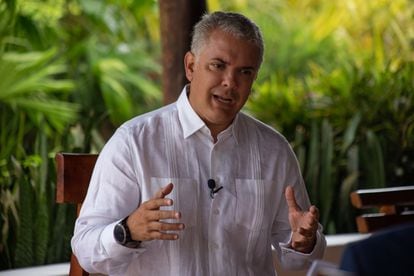The president of Colombia, Iván Duque, during a visit to the Ecuadorian island of Galapagos, on January 15, 2022.Vanessa Teran Collantes (EFE)
At the start of the campaign to succeed him that is already beginning to take off, the president of Colombia, Iván Duque, who is still dealing with the ravages of the pandemic, has turned economic reactivation into a mantra.
For now, not even the avalanche of cases caused by the arrival of the omicron variant has slowed it down.
The president seeks to frame in this effort the first of the three annual days without VAT that has become a flag of his Government, despite the fact that the figure has been surrounded by controversy and questioning.
However, the announcement of the date has left a taste of political exploitation in the midst of the delicate electoral situation.
The Duke himself revealed over the weekend that the next day without VAT will be March 11.
The month contrasts with those chosen in 2021, when they were held on October 28, November 19 and December 3, with sales of close to 30 billion pesos - more than 7,500 million dollars -, according to the Ministry. of Industry and Commerce.
“The day without VAT has helped us contain inflation, liquidate inventories, and boost trade.
In the last two years we have concentrated the days without VAT at the end or in the middle of the year.
This year we will have the first day without VAT in the first days of March”, Duque reaffirmed on Sunday in an extensive interview with the economic newspaper
Portafolio
, in which he defended that his "has been the most pro-business government that Colombia has ever had."
The first day of this 2022, the president has stressed, aims to contain inflationary effects in the first quarter.
Although the controversy that has surrounded this idea has tended to subside little by little over time, the chosen date raises suspicions.
It is the Friday immediately before the legislative elections on Sunday, March 13, in which Colombians will elect congressmen and will also vote in the inter-party consultations to choose the presidential candidates from three large coalitions.
As on previous occasions, the merchants' union – traditionally close to the Democratic Center, the government party founded by former President Álvaro Uribe – was quick to support the announcement.
However, most experts point out that these days, although they represent a relief for merchants, have little impact to improve economic activity, the treasury sacrifices billions of pesos in collection and the evidence indicates that the level household consumption does not change substantially: consumers tend to anticipate or accommodate purchases that they would have made on other days of the year.
The figure of the days without VAT eliminates the value added tax for three days in a year on products such as appliances, clothing or computers.
The Duque Administration began to apply it by decree in 2020, when the pandemic had already broken out.
In addition to the heated discussions about its convenience among economists, technicians or experts, the objections multiplied after the inopportune first day without VAT in June of that year, when the country was going through the first moment of the health crisis.
While the strict social distancing measures were still in force in the face of the first waves of infections, these regulations contrasted with the chaotic postcards of crowds in stores and shopping centers that flooded social networks and ignited reproaches to the Executive.
Later, the days without VAT were legally incorporated as part of the traumatic minimum tax reform that the Executive managed to carry out last year after an ambitious and failed first attempt – which extended the products taxed with VAT – triggered a wave of anti-government protests ripple repercussions. President Duque, in the twilight of a term characterized by low popularity ratings, has even blamed leftist Gustavo Petro, who heads all presidential polls, for the social outbreak.
"The days without VAT are an electoral and media measure rather than an economic policy aimed at solving the great tax problems that the country has," says the doctor in economics Luis Carlos Reyes, director of the Fiscal Observatory of the Pontificia Universidad Javeriana.
They attract publicity and are flashy, but unnecessarily complicate the tax system without any significant benefit as a result, he explains, pointing out the contradictions of the government's public policies.
What brought the protesters to the streets was trying to tax with VAT, 365 days a year, products from the family basket that do hit the pockets of consumers, he points out.
"This day without VAT seems to be clearly electoral, I can't find any other explanation for it," says Sergio Guzmán, political analyst and director of the Colombia Risk Analysis consultancy, about a measure that he qualifies as meaningless economic populism from the point of view of tax view. He points out that at the time of setting the date, "the president has a power that he is willing to use for the benefit of his political current," which is going through its lowest hours in the polls. “The objective of Duque no longer seems to be to reactivate the economy, but clearly to prevent Gustavo Petro from having an advantage,” he adds, warning that this attitude opens the door for the next government to also play politics with the collection.
Subscribe here
to the EL PAÍS América
newsletter
and receive all the key information on current affairs in the region.

